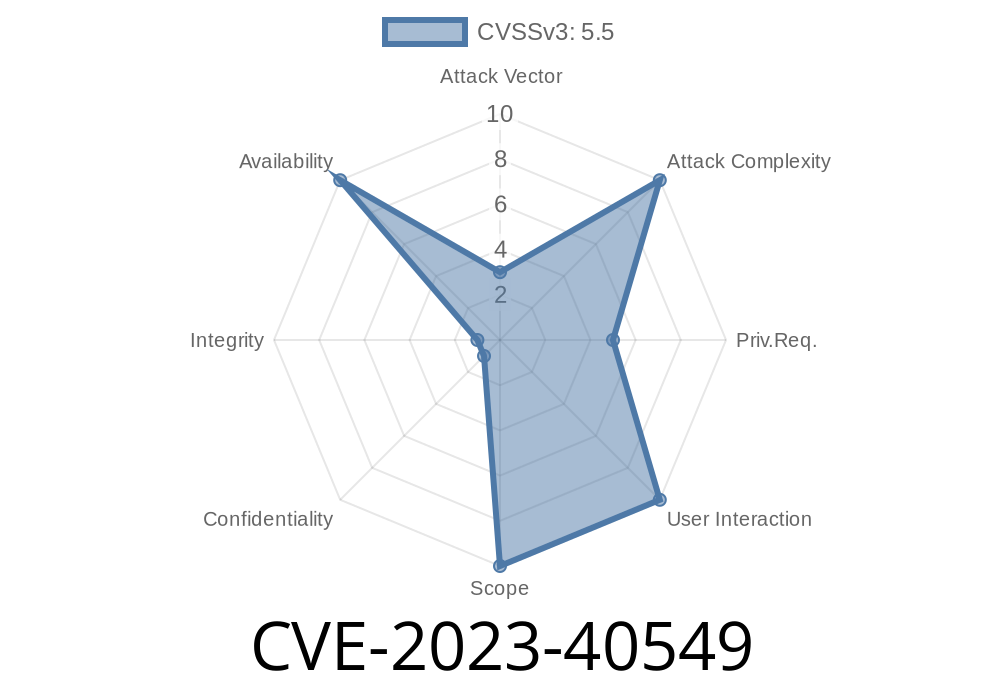If you’ve been following Linux security updates, you may have heard about CVE-2023-40549, a recent vulnerability discovered in the widely used Shim bootloader. In this article, I'll break down what this CVE means, how the flaw works, show simple code snippets, and discuss how attackers could exploit it to cause denial of service (DoS).
What Is Shim, and Why Does It Matter?
Shim is a trusted, signed bootloader. It serves as the bridge that lets Linux distributions boot securely on UEFI systems with Secure Boot enabled. By loading other bootloaders like GRUB, it ensures only signed OS code runs on startup.
If Shim breaks, your system might fail to boot — which is a serious problem for desktops, servers, and cloud platforms everywhere.
The Flaw: Out-of-Bounds Read
In simple terms, this bug is due to Shim not checking boundaries properly when loading PE (Portable Executable) binaries. An attacker can craft a malicious PE file, and when Shim tries to load it, it reads memory outside the allowed space. This will crash Shim, resulting in denial of service.
Here's the CVE summary
> "An out-of-bounds read flaw was found in Shim due to the lack of proper boundary verification during the load of a PE binary. This flaw allows an attacker to load a crafted PE binary, triggering the issue and crashing Shim, resulting in a denial of service."
How Could This Happen?
Shim expects PE files to follow certain rules. If a PE binary advertises a data section at a certain length, but provides less or points somewhere invalid, and Shim doesn't double-check before reading, it can go outside allowed memory.
A normal code block that processes PE sections *should* check the end boundaries
// Hypothetical safe check
if (section_offset + section_size > pe_binary_size) {
return EFI_LOAD_ERROR; // Don't read!
}
memcpy(dest, pe_binary + section_offset, section_size); // Safe copy
But a flaw could result if the above check is missing, or written incorrectly
// Boundary check is missing!
memcpy(dest, pe_binary + section_offset, section_size); // Oops!
If the attacker makes section_offset or section_size too big or negative, Shim will read out-of-bounds, causing a crash.
Can this be exploited for code execution?
- In its current form, it is mostly a denial of service vulnerability: Shim crashes, and your system isn't able to boot. As of now, no arbitrary code execution has been demonstrated through this bug.
How does an attacker trigger it?
- An attacker can provide a specially-crafted PE file (for example, as a replacement next-stage bootloader, or via external media if Secure Boot policies are weak).
- When Shim tries to load this invalid PE binary, the lack of bounds checking causes Shim to read memory it shouldn't, leading to a crash.
Sample pseudo-PE header causing issue
# Using Python to make a malformed PE binary
with open("evil.efi", "wb") as f:
# Write fake PE header, set offset or size fields way too large
f.write(b"MZ") # DOS header
f.write(b"\x00"*60) # Padding
f.write(b"PE\x00\x00") # PE header signature
f.write(b"\x00"*20) # COFF Header
# Set section table with huge offset/size
f.write(b"\x00"*40) # Some section with bogus info
# Not much binary content at all, triggers OOB read
When Shim tries to handle evil.efi, it can attempt to load from offsets beyond what the file really contains.
References
- Red Hat CVE-2023-40549 Advisory
- Upstream Shim GitHub Patch
- NVD CVE-2023-40549 Entry
- Shim Source Code
What Should You Do?
Patch Promptly:
Major Linux vendors have already rolled out updates and fixes. Make sure your system has the latest shim update.
Check Secure Boot Policy:
Only allow signed and trusted boot files so attackers cannot add malicious PE binaries.
Do Not Ignore Denials of Service:
While this flaw does not allow an attacker to take control of your system, anyone able to get their crafted binary loaded could crash your boot — which could cause downtime or lock you out.
Final Thoughts
CVE-2023-40549 may seem harmless at first since it’s “just” a denial of service, but anything that can crash your firmware boot process deserves real attention. Fixes are available — update your boot components and keep your Secure Boot configurations tight!
Got questions or want to see what real-world attack code might look like? Head over to the Shim GitHub repository and keep an eye on advisories.
Timeline
Published on: 01/29/2024 17:15:08 UTC
Last modified on: 04/25/2024 14:15:08 UTC
